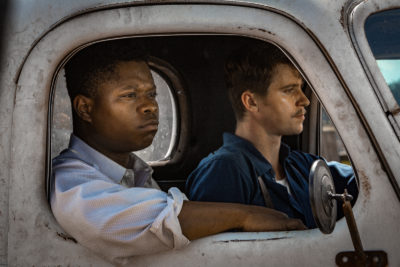
The critically-acclaimed “Mudbound” debuted on Netflix on Friday for its official release, bringing with it a phenomenal cast and scathing racial commentary that resonates — albeit painfully — with the political climate today.
Set during and after World War II, the film explores the parallel yet twistedly different experiences of two veterans and their families in Mississippi upon the soldiers’ return home.
Ronsel Jackson (Jason Mitchell) is the son of a tenant farmer working on the same land as his ancestors. When he enlists in the war, he finds that white people overseas don’t treat him differently solely because he’s black. He even falls in love with a German girl.
However, this acclimation to equality quickly backfires when he returns to the U.S. and his second-class status.
In stark contrast to Ronsel’s maltreatment, Jamie McAllan (Garrett Hedlund) returns to the praise of his family and white-dominated society.
The McAllan family owns the farm upon which the Jacksons are tenants, a morbid relationship that soon dissolves into nothing short of post-Civil War sharecropping. However, Jamie and Ronsel bond over their shared war experiences and subsequent PTSD, forming a dangerous friendship in the eyes of their Klansmen-run town.
Both Mitchell and Hedlund deliver superb performances, far outshining the acting of the somewhat whiny protagonist of Jamie’s sister-in-law and love interest Laura (Carey Mulligan). Laura serves as little more than the white face attempting to garner accolades for not being as racist as her husband and father-in-law.
Her parallel in the Jackson family, Ronsel’s mother Florence (Mary J. Blige), completely leaves Mulligan in the dust. Blige is phenomenal in her tear-jerking performance, making the heinous behavior of the McAllans all the more disgusting.
With superior acting and excellent direction from Dee Rees, it seems likely that “Mudbound” will find success at the Oscars. Whether it be for the gorgeous cinematography, perfectly designed soundtrack or stellar performances of Mitchell and Blige, the film is a genuinely excellent candidate for this year’s awards.
The film’s most integral success comes from the impeccable direction of Rees.
Rees, known for her work on “Pariah” and “Bessie,” also co-wrote the script and shows beyond doubt that despite her relatively novice status in the industry, she is not one to be underestimated.
Every shot is impeccably framed and significant, even if it only involves the subtlest of symbols. The timeline can be undeniably confusing at various points, as the film sometimes slips too far into the realm of symbolism. However, Rees redeems herself in this manner through her implementation of off-screen narrations by key characters, specifically Laura and Florence.
This usage of voiceovers laid atop symbol-heavy scenes, whether it be the graphic gutting of a chicken or forced child care, is utterly breathtaking. The beautifully twisted language, especially the words coming from Blige, reveals character development in a unique way that complements the disturbingly controlled focus of the film itself.
The onscreen dialogue is equally as biting. The harsh reality of American racism crashes down on Ronsel with an equally harsh line from the McAllan family’s biggest bigot, Laura’s father-in-law Pappy (Jonathan Banks).
“You’re in Mississippi now, n*****,” he says. “You use the back door.”
The heart-wrenching and violent racism that characterizes the entirety of the movie is all the more disquieting in the context of America’s current racial tensions amidst the rise of white nationalist groups like the Ku Klux Klan.
Whether or not Rees strategically chose to release this film at this time is unknown, but its message comes across loud and clear regardless: Just because the law states that we live in a post-racial society does not mean that it’s the reality.
“Mudbound” ultimately challenges the conventions of both filmmaking and society in a previously unheard of manner. It critically examines of this country’s past. Although wholly disturbing to watch on various occasions, it is a prime example of the power that lies at the intersection of film, history and fearlessly brilliant directing.















If you think Carey Mulligan’s performance was whiney, you must be a real pioneer woman . Her husband was a successful engineer who uprooted his city born wife and kids from a comfortable life and home in Memphis to a farm shack in Podunk on 3 days notice. ………….. I suspect you would whine more over a broken nail or heel , Miss Edelman. ………… Her performance was fantastic as was the entire ensemble.